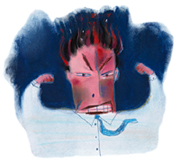 Regrettable Decision
Regrettable Decision
Butch had been high school and college soccer star and had coached my sons' indoor team that winter before I asked him to be my assistant coach on a team I was preparing to take to an international tournament in Scotland that summer. At a tune-up tournament over Memorial Day weekend, Butch had exhibited some disturbing behavior (challenging the opposing coach to a fight on the sideline during the game). I also began to see in Butch a win-at-all cost attitude that was completely at odds with my coaching philosophy. He informed me that the 'best" eleven or twelve players would get the lion's share of the playing time in Scotland, and that the other six or seven players would have to ride the bench and were likely to see little action, even though their families were paying their way to the tournament, and despite my promise to them that everyone would get roughly equal playing time.
Increasingly worried that I had made a mistake in taking Butch on as an assistant, I finally decided to follow the suggestions of several parents (and my mother's intuition) and ask around about Butch. I learned about several troubling incidents in Butch's past that raised concerns about his character.
Angry Confrontation
Armed with the information, I confronted Butch and asked him if there was anything in his background I should know about. Butch flew into such a rage that, had I not asked the question in the middle of a soccer field with parents and players looking on, I would have feared for my safety. Rather than agree to my request for a copy of his police record, Butch quit the team on the spot.
The next day Butch told me he had reconsidered and wanted his job back as assistant coach. I told him that I would consider it, but only if he could act like a mature adult, answer my questions about his background and accept the fact that, whether he liked it or not, the players would all get roughly equal playing time, even if it meant we lost every game in Scotland. When he refused to sit in the same room with me to discuss my concerns and coaching philosophy, I knew that, as a parent and a coach, I could not run the risk Butch might have posed to the psychological health of my sons and the other members of the team if I allowed him to make the trip to Scotland with us.
Dispelling A Myth
I had almost fallen victim to believing the all-too-common myth that a good athlete automatically makes a good coach. "Unfortunately, there's still sort of this belief when it comes to sports that if you've played it, you can coach it, and if you've played it really well, you'll be a really good coach," observes Karen Partlow, National Director of American Sports Education Program, one of the country's best-known training programs for coaches and administrators. "Parents should not blindly tell their kids, 'Do what the coach says,'" says Helen Lenskyj, an education professor in Toronto. "Parents need to be more pro-active and check these people out, just like you would a babysitter or a pediatrician."
As Dr. Lyle Micheli, Director of Sports Medicine at Children's Hospital in Boston, notes, "Sports participation is usually a positive experience when coaches are knowledgeable about the developmental realities of young adolescents. Unfortunately, in some cases, coaches mirror the attitudes and behaviors of collegiate and professional sports coaches, which are frequently negative and lead to unpleasant and dangerous situations. Far too frequently, coaches on those higher levels emphasize winning at any cost, glorify violent behavior and allow superstar athletes to argue and fight. The examples provided by these sports teams and their coaches often have a detrimental impact on young adolescent athletes, and their families."
Dirty Little Secret
All too often, coaches who verbally and psychologically abuse their players are allowed to continue coaching simply because they win. Well-known examples of abusive coaches at the college and high school level, like basketball coach Bobby Knight, abound. Unfortunately, what is generally not known is that more and more coaches at the youth level are allowed to continue coaching psychologically fragile pre-teens and adolescents despite the fact that they, like Knight, psychologically abuse their players, simply because they win. That this bottom-line mentality has filtered all the way down to the t-ball level is one of youth sport's dirty little secrets.









